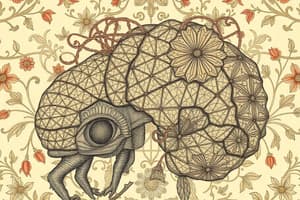Podcast
Questions and Answers
What is typically used to treat phobias?
What is typically used to treat phobias?
- Counterconditioning (correct)
- Psychoanalysis
- Cognitive Behavioral Therapy
- Antidepressant medication
Which model explains depression through cognitive processes?
Which model explains depression through cognitive processes?
- ABC Model (correct)
- Client Centred Model
- Conditioning Model
- Biological Model
What approach is primarily used to understand phobias?
What approach is primarily used to understand phobias?
- Psychodynamic Approach
- Cognitive Approach
- Behavioral Approach (correct)
- Humanistic Approach
What is the primary method of treating OCD?
What is the primary method of treating OCD?
Which of the following best describes the idiographic approach?
Which of the following best describes the idiographic approach?
What is the primary focus of structuralism in psychology?
What is the primary focus of structuralism in psychology?
Which method is commonly associated with introspection?
Which method is commonly associated with introspection?
Which of the following correctly describes the basis of operant conditioning?
Which of the following correctly describes the basis of operant conditioning?
What is one real-world application of behaviorist principles according to the content?
What is one real-world application of behaviorist principles according to the content?
What limitation is associated with the behaviorist approach?
What limitation is associated with the behaviorist approach?
What approach to behavior emphasizes the importance of multiple influencing factors?
What approach to behavior emphasizes the importance of multiple influencing factors?
Which type of conditioning was originally studied by Pavlov?
Which type of conditioning was originally studied by Pavlov?
What does the token economy system illustrate in the context of the behaviorist approach?
What does the token economy system illustrate in the context of the behaviorist approach?
What did Bandura's Bobo Doll study suggest about children's violent behavior?
What did Bandura's Bobo Doll study suggest about children's violent behavior?
What is a strength of the cognitive approach in psychology?
What is a strength of the cognitive approach in psychology?
What is a key concept in cognitive psychology that helps to organize knowledge?
What is a key concept in cognitive psychology that helps to organize knowledge?
What does the cognitive model of depression suggest about faulty thoughts?
What does the cognitive model of depression suggest about faulty thoughts?
Which limitation is associated with the cognitive approach?
Which limitation is associated with the cognitive approach?
What does the use of theoretical models in the cognitive approach help researchers to do?
What does the use of theoretical models in the cognitive approach help researchers to do?
How does cognitive behavioral therapy (CBT) aim to improve patient outcomes?
How does cognitive behavioral therapy (CBT) aim to improve patient outcomes?
What role does attention play in the cognitive approach?
What role does attention play in the cognitive approach?
What is machine reductionism primarily concerned with?
What is machine reductionism primarily concerned with?
What does cognitive neuroscience primarily study?
What does cognitive neuroscience primarily study?
Which of the following is a method used in cognitive neuroscience?
Which of the following is a method used in cognitive neuroscience?
What is a potential limitation of cognitive neuroscience?
What is a potential limitation of cognitive neuroscience?
Which factor is NOT taken into account by machine reductionism when explaining behavior?
Which factor is NOT taken into account by machine reductionism when explaining behavior?
What was one significant contribution of cognitive neuroscience since the 1970s?
What was one significant contribution of cognitive neuroscience since the 1970s?
Which is a potential benefit of using imaging techniques in cognitive neuroscience?
Which is a potential benefit of using imaging techniques in cognitive neuroscience?
What aspect of cognition does cognitive neuroscience NOT typically emphasize?
What aspect of cognition does cognitive neuroscience NOT typically emphasize?
What does the activation of the parahippocampal gyrus in people with OCD indicate?
What does the activation of the parahippocampal gyrus in people with OCD indicate?
Which factor is NOT mentioned as part of the biological approach to understanding behavior?
Which factor is NOT mentioned as part of the biological approach to understanding behavior?
How does the biological approach explain the occurrence of depression?
How does the biological approach explain the occurrence of depression?
What is a practical application of the biological approach mentioned in the content?
What is a practical application of the biological approach mentioned in the content?
What limitation of the biological approach is highlighted?
What limitation of the biological approach is highlighted?
Which of the following statements about hormones is true according to the content?
Which of the following statements about hormones is true according to the content?
What role do neurotransmitters play according to the biological approach?
What role do neurotransmitters play according to the biological approach?
What aspect of the biological approach improves its validity and applicability?
What aspect of the biological approach improves its validity and applicability?
What does self-actualization refer to in the humanistic approach?
What does self-actualization refer to in the humanistic approach?
Which of the following needs is at the base of Maslow's hierarchy?
Which of the following needs is at the base of Maslow's hierarchy?
What is congruence in the context of Roger's theory of the self?
What is congruence in the context of Roger's theory of the self?
What could lead to a person experiencing anxiety according to the humanistic approach?
What could lead to a person experiencing anxiety according to the humanistic approach?
Which factor is essential for achieving high self-esteem?
Which factor is essential for achieving high self-esteem?
What is the definition of 'conditions of worth' in Roger's theory?
What is the definition of 'conditions of worth' in Roger's theory?
Why is the psychodynamic approach considered to have reduced validity?
Why is the psychodynamic approach considered to have reduced validity?
What is a major strength of the humanistic approach in psychology?
What is a major strength of the humanistic approach in psychology?
Flashcards
Structuralism
Structuralism
An approach in psychology that breaks down mental processes into their simplest components like thoughts, feelings and sensations.
Introspection
Introspection
A technique used by structuralists to study the mind by having individuals introspect and report their conscious experiences in response to stimuli like images or sounds.
Behaviorism
Behaviorism
The theory that all behavior is learned through interactions with the environment.
Classical Conditioning
Classical Conditioning
Signup and view all the flashcards
Operant Conditioning
Operant Conditioning
Signup and view all the flashcards
Positive Reinforcement
Positive Reinforcement
Signup and view all the flashcards
Negative Reinforcement
Negative Reinforcement
Signup and view all the flashcards
Environmental Reductionism
Environmental Reductionism
Signup and view all the flashcards
Social Learning Theory
Social Learning Theory
Signup and view all the flashcards
Bandura's Bobo Doll Study
Bandura's Bobo Doll Study
Signup and view all the flashcards
Demand Characteristics
Demand Characteristics
Signup and view all the flashcards
Cognitive Processes
Cognitive Processes
Signup and view all the flashcards
Inference in Cognitive Psychology
Inference in Cognitive Psychology
Signup and view all the flashcards
Schemas
Schemas
Signup and view all the flashcards
Theoretical Model (Cognitive Psychology)
Theoretical Model (Cognitive Psychology)
Signup and view all the flashcards
Computer Model (Cognitive Psychology)
Computer Model (Cognitive Psychology)
Signup and view all the flashcards
Cognitive Neuroscience
Cognitive Neuroscience
Signup and view all the flashcards
Machine Reductionism
Machine Reductionism
Signup and view all the flashcards
Cognitive Neuroscience
Cognitive Neuroscience
Signup and view all the flashcards
Multi Store Model
Multi Store Model
Signup and view all the flashcards
Neuroimaging
Neuroimaging
Signup and view all the flashcards
Origin of Cognitive Neuroscience
Origin of Cognitive Neuroscience
Signup and view all the flashcards
Holistic Understanding
Holistic Understanding
Signup and view all the flashcards
Interactionist Approach
Interactionist Approach
Signup and view all the flashcards
Biological Determinism
Biological Determinism
Signup and view all the flashcards
Idiographic
Idiographic
Signup and view all the flashcards
Psychodynamic Explanation
Psychodynamic Explanation
Signup and view all the flashcards
Environmental Determinism
Environmental Determinism
Signup and view all the flashcards
Cognitive Behavioral Therapy (CBT)
Cognitive Behavioral Therapy (CBT)
Signup and view all the flashcards
Correlation ≠ Causation
Correlation ≠ Causation
Signup and view all the flashcards
Behavioral Genetics
Behavioral Genetics
Signup and view all the flashcards
Evolution
Evolution
Signup and view all the flashcards
Neurochemistry
Neurochemistry
Signup and view all the flashcards
Neuroanatomy
Neuroanatomy
Signup and view all the flashcards
Hormones
Hormones
Signup and view all the flashcards
Biological Approach Practical Applications
Biological Approach Practical Applications
Signup and view all the flashcards
Biological Reductionism
Biological Reductionism
Signup and view all the flashcards
Maslow's Hierarchy of Needs
Maslow's Hierarchy of Needs
Signup and view all the flashcards
Self-Actualization
Self-Actualization
Signup and view all the flashcards
Congruence
Congruence
Signup and view all the flashcards
Incongruence
Incongruence
Signup and view all the flashcards
Conditions of Worth
Conditions of Worth
Signup and view all the flashcards
Unconditional Positive Regard
Unconditional Positive Regard
Signup and view all the flashcards
Humanistic Approach and Mental Health
Humanistic Approach and Mental Health
Signup and view all the flashcards
Real-World Applications of the Humanistic Approach
Real-World Applications of the Humanistic Approach
Signup and view all the flashcards
Study Notes
Approaches in Psychology
-
Origins of Psychology:
- Leipzig, Germany 1870s
- Separated psychology from philosophical roots
- First psychological lab established
- First psychology textbook published
- Paved the way for behaviourist and cognitive approaches
-
Structuralism:
- Mind broken down into parts (thoughts, feelings, sensations)
- Introspection used to examine these parts
- Strengths: made psychology more scientific
- Limitations: criticised for not being scientific enough
-
Behaviourism:
- Behaviour learned from the environment.
- Classical Conditioning (Pavlov):
- Neutral stimulus (NS) paired with unconditioned stimulus (UCS)
- Unconditioned response (UCR) becomes conditioned response (CR) to the NS
- NS becomes conditioned stimulus (CS)
- Operant Conditioning (Skinner):
- Learning through consequences
- Positive reinforcement: desired behaviour rewarded, increasing likelihood of repetition
- Negative reinforcement: undesirable stimulus removed, increasing likelihood of repetition
- Punishment: undesirable stimulus added, decreasing likelihood of repetition
- Strengths: real-world applications in explaining and treating conditions like phobias and schizophrenia
- Limitations: environmentally reductionist; doesn't consider other influences on behaviour
Social Learning Theory
- Modelling: Learning by observing and imitating behaviours
- Imitation: Copying behaviours of others, especially role models.
- Identification: Internalising behaviours of role models based on perceived qualities
- Vicarious Reinforcement: Learning based on observing consequences of other's actions
- Mediational Processes: attention, retention, motor reproduction, motivation
Cognitive Approach
- Internal Mental Processes: Attention, memory, decision-making
- Inference: Using studies and evidence to understand mental processes
- Schemas: Cognitive frameworks to organise knowledge and process information
- Theoretical Models: Diagrammatic representations of theories
- Computer Models: Using computer analogies to explain brain functions.
- Strengths: Real-world applications in explaining mental illness (depression) and treatment (CBT).
- Limitations: Machine reductionist; doesn't consider other factors influencing behaviour
Cognitive Neuroscience
- Studying the influence of brain structures on mental processes.
- Uses neuroimaging techniques (MRI, fMRI, PET, EEG) to map brain activity during tasks.
Biological Approach
- Genetics: Influence of genes on behaviour
- Evolution: Behaviour shaped by evolution to increase survival & reproduction
- Neurochemistry: Study of neurochemicals (e.g., neurotransmitters) that influence behaviours
- Neuroanatomy: Study of brain structure and function
- Hormones: Influence psychological functions
- Strengths: Real-world applications in explaining mental illness and treatments (e.g., medication for depression).
- Limitations: Biological reductionism; doesn't account for other influences on behaviour
Psychodynamic Approach
- Iceberg Metaphor: Unconscious mind influences behaviour, thoughts, memories (repressed)
- Tripartite Personality: Id (instincts), ego (mediator), superego (morality)
- Psychosexual Stages: Stages of development with potential fixations
- Defence Mechanisms: Protect the mind from overwhelming emotions
- Strengths: Explains mental illness and behaviours (e.g. trauma) and influential in therapy methods
- Limitations: Unscientific; heavily relies on case studies; subjective interpretations
Humanistic Approach
- Maslow's Hierarchy of Needs: Needs must be met before reaching self-actualisation
- Self-Actualization: Achieving one's full potential
- Roger's Theory of the Self: Congruence (match between self-image & ideal self)
- Conditions of Worth/Unconditional Positive Regard: Conditions for self-acceptance or lack thereof
- Strengths: Focuses on human potential and personal growth.
- Limitations: Unscientific; subjective; hard to measure
Studying That Suits You
Use AI to generate personalized quizzes and flashcards to suit your learning preferences.




